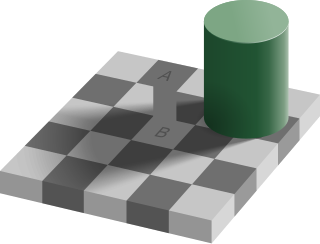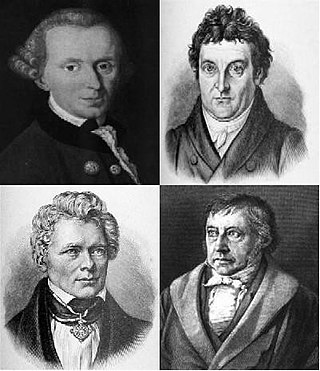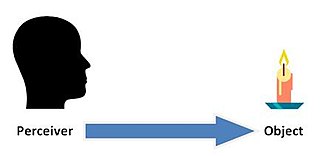
In philosophy, the term idealism identifies and describes metaphysical perspectives which assert that reality is indistinguishable and inseparable from perception and understanding; that reality is a mental construct closely connected to ideas. Idealist perspectives are in two categories: subjective idealism, which proposes that a material object exists only to the extent that a human being perceives the object; and objective idealism, which proposes the existence of an objective consciousness that exists prior to and independently of human consciousness, thus the existence of the object is independent of human perception.

Metaphysics is the branch of philosophy that studies the fundamental nature of reality; the first principles of being, identity and change, space and time, cause and effect, necessity and possibility.
Materialism is a form of philosophical monism which holds matter to be the fundamental substance in nature, and all things, including mental states and consciousness, are results of material interactions. According to philosophical materialism, mind and consciousness are by-products or epiphenomena of material processes, without which they cannot exist. This concept directly contrasts with idealism, where mind and consciousness are first-order realities to which matter is dependent while material interactions are secondary.
Philosophy of religion is "the philosophical examination of the central themes and concepts involved in religious traditions". Philosophical discussions on such topics date from ancient times, and appear in the earliest known texts concerning philosophy. The field is related to many other branches of philosophy, including metaphysics, epistemology, and ethics.

The philosophy of perception is concerned with the nature of perceptual experience and the status of perceptual data, in particular how they relate to beliefs about, or knowledge of, the world. Any explicit account of perception requires a commitment to one of a variety of ontological or metaphysical views. Philosophers distinguish internalist accounts, which assume that perceptions of objects, and knowledge or beliefs about them, are aspects of an individual's mind, and externalist accounts, which state that they constitute real aspects of the world external to the individual. The position of naïve realism—the 'everyday' impression of physical objects constituting what is perceived—is to some extent contradicted by the occurrence of perceptual illusions and hallucinations and the relativity of perceptual experience as well as certain insights in science. Realist conceptions include phenomenalism and direct and indirect realism. Anti-realist conceptions include idealism and skepticism. Recent philosophical work have expanded on the philosophical features of perception by going beyond the single paradigm of vision.
Reality is the sum or aggregate of all that is real or existent within a system, as opposed to that which is only imaginary. The term is also used to refer to the ontological status of things, indicating their existence. In physical terms, reality is the totality of a system, known and unknown.
Solipsism is the philosophical idea that only one's mind is sure to exist. As an epistemological position, solipsism holds that knowledge of anything outside one's own mind is unsure; the external world and other minds cannot be known and might not exist outside the mind.

German idealism was a philosophical movement that emerged in Germany in the late 18th and early 19th centuries. It developed out of the work of Immanuel Kant in the 1780s and 1790s, and was closely linked both with Romanticism and the revolutionary politics of the Enlightenment. The best-known thinkers in the movement, besides Kant, were Johann Gottlieb Fichte, Friedrich Wilhelm Joseph Schelling, Georg Wilhelm Friedrich Hegel, and the proponents of Jena Romanticism. August Ludwig Hülsen, Friedrich Heinrich Jacobi, Gottlob Ernst Schulze, Karl Leonhard Reinhold, Salomon Maimon and Friedrich Schleiermacher also made major contributions.

Subjective idealism, or empirical idealism, is a form of philosophical monism that holds that only minds and mental contents exist. It entails and is generally identified or associated with immaterialism, the doctrine that material things do not exist. Subjective idealism rejects dualism, neutral monism, and materialism; indeed, it is the contrary of eliminative materialism, the doctrine that all or some classes of mental phenomena do not exist, but are sheer illusions.

Transcendental idealism is a philosophical system founded by German philosopher Immanuel Kant in the 18th century. Kant's epistemological program is found throughout his Critique of Pure Reason (1781). By transcendental Kant means that his philosophical approach to knowledge transcends mere consideration of sensory evidence and requires an understanding of the mind's innate modes of processing that sensory evidence.

In the philosophy of perception and philosophy of mind, the question of direct or naïve realism, as opposed to indirect or representational realism, is the debate over the nature of conscious experience; out of the metaphysical question of whether the world we see around us is the real world itself or merely an internal perceptual copy of that world generated by our conscious experience.
The hard problem of consciousness asks why and how humans have qualia or phenomenal experiences. This is in contrast to the "easy problems" of explaining the physical systems that give us and other animals the ability to discriminate, integrate information, and so forth. These problems are seen as relatively easy because all that is required for their solution is to specify the mechanisms that perform such functions. Philosopher David Chalmers writes that even once we have solved all such problems about the brain and experience, the hard problem will still persist.
Philosophical realism is usually not treated as a position of its own but as a stance towards other subject matters. Realism about a certain kind of thing is the thesis that this kind of thing has mind-independent existence, i.e. that it is not just a mere appearance in the eye of the beholder. This includes a number of positions within epistemology and metaphysics which express that a given thing instead exists independently of knowledge, thought, or understanding. This can apply to items such as the physical world, the past and future, other minds, and the self, though may also apply less directly to things such as universals, mathematical truths, moral truths, and thought itself. However, realism may also include various positions which instead reject metaphysical treatments of reality entirely.
Idealism in the foreign policy context holds that a nation-state should make its internal political philosophy the goal of its conduct and rhetoric in international affairs. For example, an idealist might believe that ending poverty at home should be coupled with tackling poverty abroad. Both within and outside of the United States, American president Woodrow Wilson is widely considered an early advocate of idealism and codifier of its practical meaning; specific actions cited include the issuing of the famous "Fourteen Points".

This glossary of philosophy is a list of definitions of terms and concepts relevant to philosophy and related disciplines, including logic, ethics, and theology.
Philosophy is the study of general and fundamental problems concerning matters such as existence, knowledge, values, reason, mind, and language. It is distinguished from other ways of addressing fundamental questions by being critical and generally systematic and by its reliance on rational argument. It involves logical analysis of language and clarification of the meaning of words and concepts.
Metaphysics is the branch of philosophy that investigates principles of reality transcending those of any particular science. Cosmology and ontology are traditional branches of metaphysics. It is concerned with explaining the fundamental nature of being and the world. Someone who studies metaphysics can be called either a "metaphysician" or a "metaphysicist".
The following outline is provided as an overview of and topical guide to metaphysics:

American philosophy is the activity, corpus, and tradition of philosophers affiliated with the United States. The Internet Encyclopedia of Philosophy notes that while it lacks a "core of defining features, American Philosophy can nevertheless be seen as both reflecting and shaping collective American identity over the history of the nation". The philosophy of the Founding Fathers of the United States is largely seen as an extension of the European Enlightenment. A small number of philosophies are known as American in origin, namely pragmatism and transcendentalism, with their most prominent proponents being the philosophers William James and Ralph Waldo Emerson respectively.







